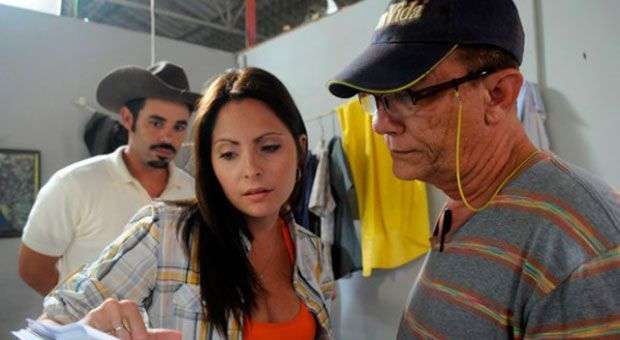Although the plot and events of the Cuban telenovela Land of fire are not as hot as its title promises, at least it manages to establish indisputable bridges of communication and ease with hundreds of thousands of viewers convened three times a week, in prime time to sit in front of their home screen. Thus, we can speak of media spectacle with full rights, as is often the plot, the work of interpreters or the attitudes of the characters become the subject of frequent discussions and become part of the everyday life.
Such a “state of grace” becomes news as it means a rare privilege in recent times, because previous television products, broadcast in that tim, barely managed to meet regular expectations of entertainment and pleasure . So that should be recognized in the Land of Fire the will to rise , improvement , repair simplicity among professionals who took part in this endeavor , despite the telenovela lacking completely- some think that luckily , others claim that unfortunately – the fire passions announced by the same title and illegally reinforced by television advertisements and promotions, responsible for raising completely unfounded expectations.
What no one can be denied is the fact that Cubans have been carried away by the bucolic charm of a soap opera representing a way out from a deep hole in terms of the production of soap operas and drama series. The reasons of seduction: there is a story of thwarted love, ie unfinished relationship, attraction impeded by the fact that both protagonists are married and have children. The central story is surrounded, as in any soap opera that is respected by several triangles, secrets, adultery, gossip and different loyalties, that spice the plot and managed to attract the attention of the mass audience, despite competition of Brazilian products like Insensato Corazon and Avenida Brasil .
The modest Land of Fire in its favor has the always applauded attempt to reflect a plausible picture, while nice, of contemporary Cuba. Everything is set in the countryside between farms, cooperatives, dairies and grooves to which Ignacio returns, the lover, to meet his first love, Isabel, head of the cooperative and young little lady now married to the evil Julio. One of the virtues of this telenovela is associated with the breath-taking images in agricultural and grazing landscapes, while the script and most of the actors struggled to incorporate spins, sayings, expressions and accents and getting a reproduction quite acceptable of life in the Cuban countryside today.
While in Cuba many viewers question the unrealistic comfort in some of these countryside houses –as if embellishment and mystification were not among the inviolable dictates of the soap operas-at the end finally overcame, while credible, these farmers of Palmarito and the farms Dos hermanas, La Esperanza and La Fortuna, in conversation or discussions in the same terms that anyone can listen to, when visiting, in the mountains, the central region of the island
While it is true that in many chapters are the pitfalls of superficiality, or the implausibility, especially when referring to the internal problems of the cooperative and labor relations, no one can deny that such inclinations are common in Mexican, Venezuelan or Colombian soap operas, because all social or artistic element becomes brushstroke to enhance the vagaries of the complicated story of love and Montague— Capulet hostility between the two rival families. Neither contributes to realism the Manichean division between the corrupt and vicious Havana people (gentrified, softies, hustlers) and the countryside people which represent all the virtues of honest work or virginal innocence. And while we all agree that schemes, fetched black and white solutions policies are inherent to international telenovela is worth remembering that certain Cuban visual traditions have proved luckily this genre from the rigors and complexities of the most incisive contemporary stories and still be credible.
When the public work and professional world of the characters is inserted with intelligence in TV series it can become a source of conflict for the characters, and valid knowledge to the viewer. And Land of fire just failed to nest in a suggestive story, spheres of public and private, social and intimate lives. Because we seem to have forgotten that in this country was not only the classic telenovela born (it is useless to keep crying about the lack of products like El derecho de nacer, Sol de batey o Tierra brava), but also produced series that are managed to handle some codes of melodrama and also dealt with some of the major problems of the present. Come to mind La séptima familia, La semilla escondida, Doble juego and La otra cara , among many others.
Then, the sweat and sacrifice of peasants were reduced sometimes to a hint, the easy line and externality, but Fire Lands evidence serious and well-intentioned work in all areas, a group of talented people and desire to struggle to put forward a valid idea. And to see the reality of the fields in Cuba will remain those documentaries made by ICAIC in the sixties and eighties, or the reports of Television Serrana in much more recent date. Because the soap opera, at least some of them, are pleased to distance itself from realism, and its makers say that entertainment can only be achieved by sweetening elusive reality. But such assumptions are certainly debatable .










